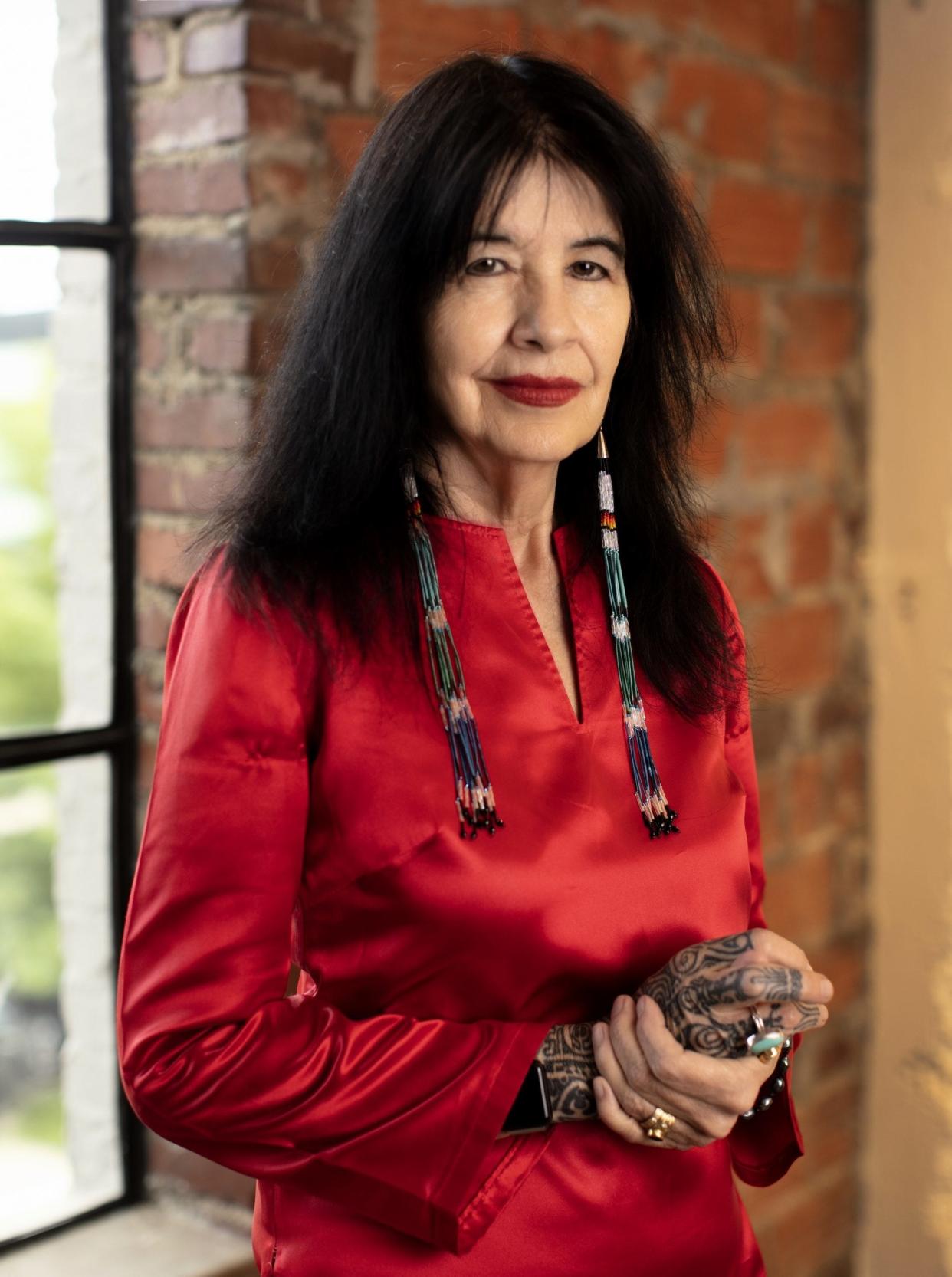'You just write.' Incumbent U.S. poet laureate visits Massillon

- Oops!Something went wrong.Please try again later.
MASSILLON – Joy Harjo sees the world and its people, places and things as a giant "story field."
From trees in your backyard, to your own families and towns, stories of all of them are interwoven in endless layers. And every story has a place, a purpose — the good, the bad and the ugly.
More: Massillon Museum kicks off Big Read with free book distribution Saturday
"Some stories are difficult to look at, because it makes us look at the worst part of ourselves," she told a crowd of about 175 people, who came to the Massillon Museum on Thursday night to hear a keynote address for the Big Read from Harjo, the incumbent U.S. poet laureate.
Difficult stories such as the chaos of war. Challenging narratives about subjects such as abortion. Difficult reckonings, such as the plight of her own southeastern U.S. Native American ancestors, pushed from their lands, to the west, by the Indian Relocation Act of 1830.
Some of Harjo's poetry readings
The 70-year-old Harjo is a member of the Muscogee (Creek) Nation, a self-governed tribe near Tulsa, Oklahoma. Dressed in black pants and a black shirt, both the same color as her long, straight hair, she dazzled her captive audience with stories, song and readings of her own poems.
Most were from her collection in the book "An American Sunrise," published in 2019, and inspired by Harjo's visit to the southeastern U.S.
More: What's new at the Mu? Native American artwork to supplement Big Read
Pieces like "How to Write a poem in a Time of War," which opens with:
You can’t begin just anywhere. It’s a wreck.
Shrapnel and the eye
Of a house, a row of houses. There’s a rat scrambling
From light with fleshy trash in its mouth. A baby strapped to its mother’s back
Cut loose.
Or "Break My Heart," which begins:
The Poetry Foundation said this about her: "To read the poetry of Joy Harjo is to hear the voice of the earth, to see the landscape of time and timelessness, and, most important, to get a glimpse of people who struggle to understand, to know themselves, and to survive."
First Native American poet laureate
Harjo has won numerous awards for her work, which includes nine poetry books. But it was "An American Sunrise" that brought her to Massillon. The event was part of the city's 2022 Big Read, funded by the National Endowment for the Arts, in partnership with Arts Midwest.
Locally, the Museum and Massillon Public Library partner with civic groups and schools to present a slew of events tied to "An American Sunrise." Everything from book discussion groups to a current Museum exhibit, featuring artwork by contemporary Indian artists.
Stephanie Toole, the museum's education and outreach coordinator, said it's the 15th consecutive Big Read in Massillon, and the first time that a book of poems was chosen.
Over the years, Big Read has provided 30,000 free books to the community and brought in author Tobias Wolff, poet Julia Alvarez and artist Charles Vess, just to name a few.
Harjo, who became a mother in her teens, a grandmother in her 30s, and now is a great grandmother, said being a poet wasn't a lifelong dream. It just sort of happened. She was 15 credit hours from a studio arts degree when she switched course and began to write.
Writing helps her make sense of what she sees and feels, often when it builds to an internal boiling point.
"You just write," she explained.
Her career landed her the poet laureate title in 2019. She was the 23rd one in the U.S. and the first Native American. She also is only the second to serve three terms; her last stint just ended.
So, what is a poet laureate anyway?
The New York Public Library website explained it pretty well in a 2017 blog post by Nicholas Parker:
The official title is “Poet Laureate Consultant in Poetry," and it's selected by the Librarian of Congress; the position has non-specific job duties, but typically champions reading, writing and poetry; the role dates to 1937, though laureate was added to the title in 1986; the salary is $35,000 plus a stipend for travel expenses, paid for by an endowment created by Archer M. Huntington, who established the original consultant in poetry position.
This article originally appeared on The Repository: Poet Harjo told stories and shared insight on writing and stories

